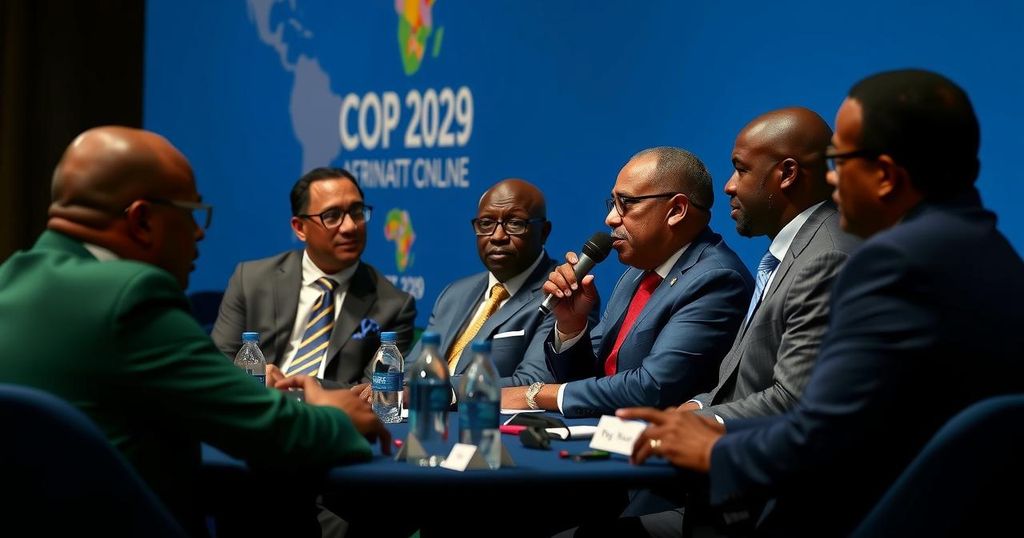African Climate Leadership at COP29: Navigating Challenges and Opportunities

COP29 presents African nations with an essential opportunity to advocate for a New Quantified Goal on Climate Finance as they face severe climate challenges, including drought and biodiversity loss. With significant portions of the population projected to be affected by climate impacts, innovative financing solutions and strong mitigation strategies in newly formulated NDCs are critical. Africa’s unique resources and demographics equip the continent to lead in sustainable development amidst global climate negotiations.
At COP29, African nations face a crucial opportunity to address the intertwined challenges of climate change, land degradation, and biodiversity loss. Under the leadership of esteemed figures such as Dr. Fitsum Assefa Adela, Africa can leverage the upcoming negotiations to push for a New Quantified Goal on Climate Finance. This goal is fundamental as Southern Africa grapples with severe drought; the vulnerability of the continent necessitates united action to combat the spiraling crises of climate change, land degradation, and pollution. The World Meteorological Organization forecasts that, by 2030, approximately 118 million of Africa’s extreme poor will encounter dire climate impacts such as drought, floods, and intense heat. With countries losing up to five percent of their GDP due to climate-induced challenges, effective international collaboration is essential to bridge the adaptation finance gap, estimated at $187-$359 billion per year. Innovations in financing methods, such as debt-for-nature swaps, could foster resilience and encourage private sector investments. Mitigation, however, is equally vital alongside adaptation. African nations, while historically minor contributors to emissions, are positioned to implement low-carbon development strategies. In this context, newly formulated Nationally Determined Contributions (NDCs) should align with developmental goals aimed at creating green jobs and promoting renewable energy, reinforcing Africa’s role as a solution-oriented continent. Africa’s rich resources and youthful population present significant opportunities for innovation in food security, climate resilience, and energy transitions. By capitalizing on the rising demand for critical minerals, African countries can enhance their economic positions, ensuring that value addition and resource management prioritize sustainability and environmental stewardship. Climate change poses profound challenges for Africa, yet it also heralds avenues for leadership in global climate discourse. Africa’s commitment to proactive and responsible resource management, alongside its strategic positioning in climate negotiations, can catalyze transformative change and secure a sustainable future for its people.
The discourse surrounding African leadership at COP29 is imperative as nations on the continent confront profound climate challenges exacerbated by historical injustices and disproportionate impacts of climate change. This critical juncture emphasizes the necessity for strategic planning and collaborative efforts to address the dual issues of adaptation and mitigation in the face of escalating environmental crises. With extreme climate events predicted to impact millions, the call for united action and innovative financing solutions is increasingly urgent under the regional and global frameworks for sustainable development.
In conclusion, COP29 serves as a pivotal platform for African nations to assert their determination in addressing climate challenges while seizing the potential for economic growth and sustainability. By advocating for comprehensive climate financing and transitioning to low-carbon development models, Africa can not only mitigate the adverse effects of climate change but also emerge as a leader in global environmental stewardship. The commitment to integrating local knowledge and responsible resource management will be essential in navigating the path towards a resilient and prosperous future for the continent.
Original Source: www.unep.org






